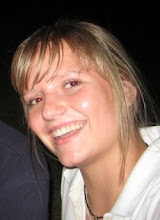-Danielle's roommate's cooler, which has nothing important in it, and has therefore not been emptied.
-John Nay's 21st birthday on February 20th.
-Sutter's image of Malpomene, Mel Gibson eating a pomegranate.
-Dr. Sexson's next appointment to give blood on March 17, on which day his blood will be green.
-Test -> Testimony -> Testicle. Enough said.
Now to the first loci experiment. I've come up with my own types of association.
1. Thermostat: Erato, because erotic poetry makes people all hot and bothered.
2. Blackboard:Urania, because Uranus is in a black sky.
3. Screen: Melpomene, because I can't get Mel Gibson out of my head and he's on the big screen.
4. "Quiet" desk: Terpsichore, because sitting at a quiet desk is a chore.
5. Overhead projector: Clio, because Miss Cleo projects futures.
6. Old table: Euterpe, because the word reminds me of Europe and it is the old country.
7. Bulletin board: Calliope, because a bulletin board calls for posters.
8. "Let it snow" drawing: Polyhymnia, because "Let It Snow" is a song.
9. "F" thing: Thalia, because two F's back-to-back make a T.
